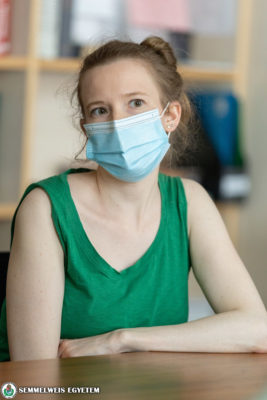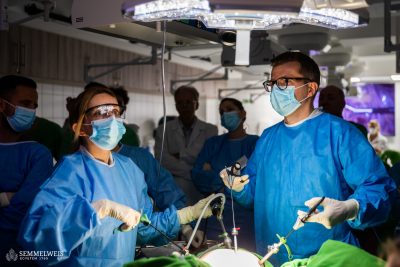In its Editor’s Pick compilation, the journal Frontiers of Neuroscience has selected most significant publications on the autonomic nervous system from the past two years. The publication of the Chronophysiology Research Group of Semmelweis University’s Department of Physiology published in 2019 was also included in the selection. The paper studied the relationship between social jetlag and the neural control of cardiac function, its first author is Ágnes Sűdy, PhD student, and corresponding author is Dr. Krisztina Káldi, Associate Professor.
The scientific paper by the Chronophysiology Research Group of the Department of Physiology at Semmelweis University was published in September 2019 in the Frontiers of Neuroscience, which the journal has now selected for its Editor’s Pick compilation. The editors have collected the most significant publications published in the journal in the past two years. The publication by Ágnes Sűdy, PhD student of Semmelweis University and Dr. Krisztina Káldi, associate professor and their colleagues (Dr. Krisztina Ella and Dr. Róbert Bódizs) examines the relationship between social jetlag and the neural control of cardiac function. Out of a total of 19 scientific papers publishing experimental results included in the selection, this publication has the highest number of views, currently more than 8,600.
 “Social jetlag means the difference in sleep timing between work and free days . One typically goes to bed earlier and gets up earlier on working days, as many of us have to arrive at our workplace by 8:00 a.m. in the morning. On the other hand, on holidays and on weekends one has the opportunity to live according to the circadian rhythm dictated by their own biological clock. This means that we can lie down when we are sleepy and get up when we have rested. There may be a difference of several hours between the two time frames. This social jetlag is like going on a journey and crossing 2-3 time zones every weekend”, explained Dr. Krisztina Káldi, Associate Professor of the Department of Physiology.
“Social jetlag means the difference in sleep timing between work and free days . One typically goes to bed earlier and gets up earlier on working days, as many of us have to arrive at our workplace by 8:00 a.m. in the morning. On the other hand, on holidays and on weekends one has the opportunity to live according to the circadian rhythm dictated by their own biological clock. This means that we can lie down when we are sleepy and get up when we have rested. There may be a difference of several hours between the two time frames. This social jetlag is like going on a journey and crossing 2-3 time zones every weekend”, explained Dr. Krisztina Káldi, Associate Professor of the Department of Physiology.
Researchers of Semmelweis University were the first to show a correlation between social jetlag and the neural control of cardiac function. According to their study, the more our sleep rhythm is determined by social expectations instead of our biological clock, the worse the quality of sleep is and the less favorable the indicators of heart rate variability are. This also means a higher risk of developing certain diseases of the circulatory system.
The staff of the Chronophysiology Research Group, in collaboration with the Institute of Behavioral Sciences, investigated whether there was a correlation between social jetlag and subjective sleep quality as well as heart rate variability, which is a good indicator of the state of the autonomic nervous system. The target population of the study were healthy young men.
“A standardized questionnaire was used to characterize sleep quality. The results showed that those who did not sleep according to the rhythm of their biological clock on working days (for example, because they would lie down later and wake up later if they could) reported poorer sleep quality. Heart rate variability, which is a good indicator of the state of the autonomic nervous system, shows small differences in the distance between each heartbeat. The data can be registered with a small body-mounted device. The results showed that those more affected by social jetlag had a lower heart rate variability on working days, which means that the adaptability of their cardiovascular system is less favorable, and this may increase the risk of developing cardiovascular diseases such as infarction or hypertension. It is also important to note that a lower heart rate variability also suggests that sleep is less restful”, pointed out Dr. Krisztina Káldi.
 “The level of social jetlag may be reduced by flexible working hours or, for example, by starting school later, since teenagers are most likely to go to bed later and get up later according to their biological clock. However, individuals may also commit themselves to being less affected by social jetlag: those who like to stay up late are advised to stay in natural light as much as possible in the morning. In addition, it is advisable to reduce intense blue light exposure in the evenings, and it is useful to change the brightness of the mobile phone and monitor screen with a blue-light filter program”, Ágnes Sűdy pointed out.
“The level of social jetlag may be reduced by flexible working hours or, for example, by starting school later, since teenagers are most likely to go to bed later and get up later according to their biological clock. However, individuals may also commit themselves to being less affected by social jetlag: those who like to stay up late are advised to stay in natural light as much as possible in the morning. In addition, it is advisable to reduce intense blue light exposure in the evenings, and it is useful to change the brightness of the mobile phone and monitor screen with a blue-light filter program”, Ágnes Sűdy pointed out.
It is also important for science to call attention to the fact that daylight saving time also increases the rate of social jetlag by deceiving our biological clock, therefore it is fundamentally harmful to our health.
Ádám Szabó
Photo: Attila Kovács – Semmelweis University
Translation: Katalin Illés-Romhányi


